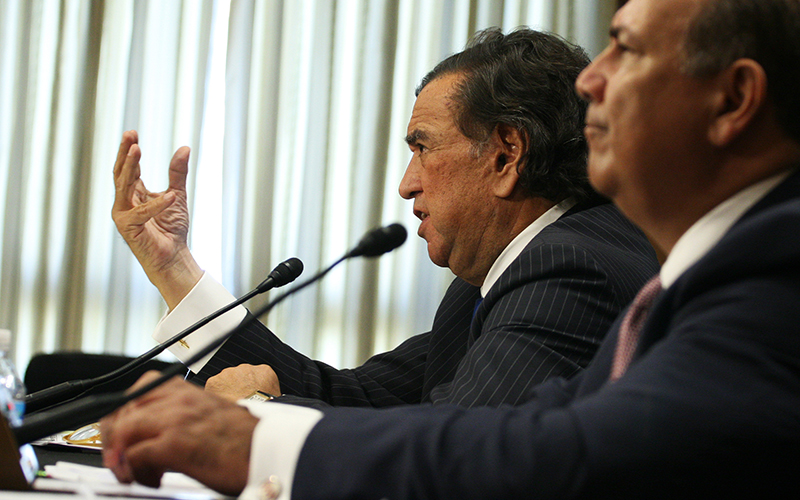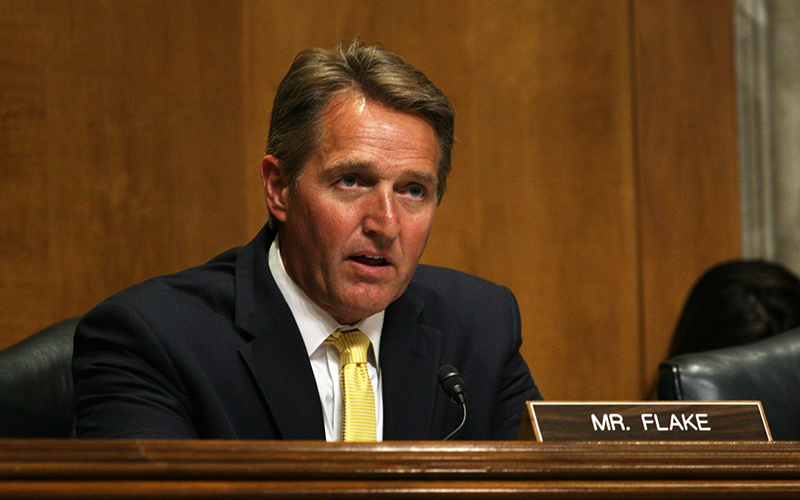
Former New Mexico Gov. Bill Richardson said that relations between the U.S. and Mexico are “in tatters,” in part because of heated rhetoric coming from the White House. (Photo by Andres Guerra Luz/Cronkite News)

Sen. Jeff Flake, R-Arizona, said good relations with Mexico are vital not just to his state but good for the United States and Mexico overall as well. (Photo by Andres Guerra Luz/Cronkite News)
WASHINGTON – Democrat Bill Richardson and Republican Jeff Flake agree on one thing: The border is no place for partisan politics.
But they and others worried at a Senate Foreign Relations subcommittee hearing Wednesday that current administration’s rhetoric could sever the “long history of cooperation” the U.S. and Mexico have enjoyed in the past.
“I’ve never seen the relationship in such bad shape as it is today,” said Richardson, the former governor of New Mexico. “It’s in tatters.”
Flake, the junior senator from Arizona, said a strained relationship is not good for states on either side of the border, pointing to $8 billion in goods and services exported from Arizona to Mexico in 2016.
“As a senator from Arizona, I obviously see firsthand the benefits of our relationship,” Flake told the subcommittee. “Trade with Mexico supports tens of thousands of jobs in Arizona.”
That was the general mood of the hearing by the Subcommittee on Western Hemisphere, Transnational Crime, Civilian Security, Democracy, Human Rights and Global Women’s Issues, which was called to look at ways to advance “security and prosperity on both sides of the border.”
Sen. Marco Rubio, R-Florida, agreed that a good relationship is important to both the U.S. and Mexico. But he also pointed to aspects of the relationship that have hurt citizens of both countries, noting that the U.S. runs a trade deficit with Mexico, where poor judicial systems have allowed drugs to flow into this country.
“Mexico remains a major transit point for illegal drugs destined for the United States as well as an originator for both heroin, marijuana and methamphetamine,” Rubio said, citing a 2016 State Department report.
But even where there are problems, Rubio said there is an obligation to work together. Mexico must fight drugs there, for example, but U.S. health agencies must focus on curtailing drug addiction to lower the demand for drugs in the U.S.
On trade, Rubio said that low production costs in Mexico in industries like agriculture have created “unfair competition” for U.S. growers. There are citizens in Mexico who would like to see trade agreements modernized to fix their shortcomings, he said.
“We need to ensure that our trade with Mexico is free but also fair,” Rubio said.
But trade between the two countries has been overall beneficial for both, said Roger Noriega, a fellow from the American Enterprise Institute. And the benefits have been more than just financial.
Noriega said the North American Free Trade Agreement has made Mexico a stronger ally, raising that country to an economic level where it can now participate in the fight against transnational organized crime.
“These agreements aren’t just about trade,” he said. “They are also used to fortify our partners and our allies and our friends, in this case, a neighbor.”
Noriega and others at the hearing said the Mexican government is already helping stem the flow of illegal immigrants into the U.S. by securing its own southern border, stopping 560,000 migrants, mostly from Central America, from reaching the U.S. border in the process.
“That’s half a million people who didn’t have a chance to test our resources on that border,” Noriega said.
Richardson said that when he was governor, his state and the Mexican state of Chihuahua had “exceptional” cooperation to combat crime and heroin addiction. His worry, he said, is that the “tremendous cooperative relationships on security, on trade, on drug interdiction on extradition” will be jeopardized by hard-line U.S. foreign policy.
Richardson suggested that Congress and the State Deparment “take the lead” on U.S.-Mexico relations instead of the White House, sooner rather than later.
“I think this is a relationship that is too valuable to let drift away into domestic politics,” Richardson said.